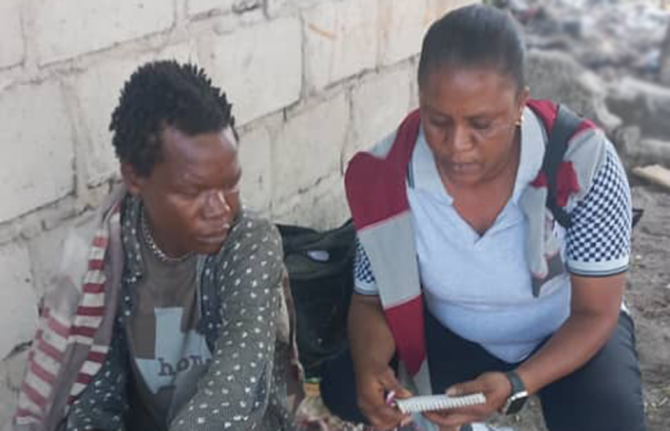
Feature Story
UNAIDS and Standard Bank Group partner to bring HIV awareness to the workplace
29 November 2012
29 November 2012 29 November 2012
Professor Sheila Tlou, Director of the UNAIDS Regional Support Team for Eastern and Southern Africa and Clive Tasker, Head of Corporate Banking International signed the memorandum of understanding between the Standard Bank Group (SBG) and UNAIDS.
The Standard Bank Group (SBG) and UNAIDS formalised, on 22 November, what had already been a long-term collaboration in the response to AIDS in sub-Saharan Africa. They signed an official memorandum of understanding (MoU) for an initial period of two years to further collaborate on AIDS education and advocacy initiatives in the workplace.
“Healthy staff and communities are high on the agenda for any corporate, especially those operating in developing countries. Without a healthy workforce, economies can’t thrive,” said Clive Tasker, Head of Corporate Banking International. “As the biggest bank in Africa, we believe that we have a role to play in supporting government health objectives. Our partnership with UNAIDS allows us to do so by working with a respected organisation to educate our staff and communities on HIV prevention and treatment, and remove the stigma associated with AIDS,” he added.
The SBG is the largest bank in Africa. It is represented in 33 countries (17 in Africa and 16 in five other continents), has over 600 branches in South Africa and over 400 outside of South Africa and employ more than 50 000 people worldwide (34 891 are in South Africa). Partnering with the SBG is providing UNAIDS with an opportunity to reach out to key communities in countries where the bank operates and where the epidemic is.
“Employers play a critical role in the AIDS response. UNAIDS is committed to bringing the knowledge, solid experience and the capacity of the private sector to the AIDS response,” said Professor Sheila Tlou, Director of the UNAIDS Regional Support Team for Eastern and Southern Africa.
The latest UNAIDS World AIDS Day 2012 report, shows that the acceleration in the AIDS response is producing unprecedented results. According to the report, the number of people accessing HIV treatment in sub-Saharan Africa reached 56%—compared to a global average of 54%. In 5 Southern African countries–Botswana, Namibia, Rwanda, Swaziland and Zambia more than 80% of people living with HIV who are eligible for treatment are receiving antiretroviral therapy. However, 7 million people still do not have access to life saving treatment which negatively impacts their wellbeing and the socio-economic development of their nations.
Project 90/90
Early in the year, the SBG piloted the ‘Project 90/90’, which aims to reach 90% of the Bank’s employees with comprehensive health assessments annually and place people in need on treatment within 90 days, by 2015. A typical 90/90 health assessment includes tests that check sugar levels, blood pressure, cholesterol, and HIV and TB status.
Healthy staff and communities are high on the agenda for any corporate, especially those operating in developing countries. Without a healthy workforce, economies can’t thrive
Clive Tasker, Head of Corporate Banking International
“If a staff member is at risk for any disease, it is our goal to get 90% of those staff onto a proper treatment programme,” said Dr Wendy Orr, Head of Inclusion at Standard Bank Group. During the six months that the pilot run in the Standard Bank Headquarters in South Africa, 6 500 out of the 16 000 of the Bank’s staff members underwent a 90/90 health assessment. Of those, approximately 65% took an HIV test. “We believe that by including an HIV test in a broad health assessment, we are starting to lessen discrimination—one of the key objectives of the UNAIDS ‘zero’ campaign,” said Dr Orr. “Following the success of our pilot, it is our intention to scale up the number of tests we do so that by 2015 all staff across the group will be receiving 90/90 screenings annually,” she added.
Community outreach
In addition to the 90/90 project, SBG remains committed to its ‘wellness champion’ programme. This programme uses voluntary staff members of the Bank as ‘champions’ to conduct awareness and mobilisation activities in order to increase uptake of voluntary HIV counselling and testing as well as condom distribution at the workplace and in communities.
During the 2011 World AIDS Day commemoration period, the ‘champions’ in collaboration with UNAIDS reached communities in Ghana, Nigeria and South Africa where more than 4 000 people voluntarily tested for HIV. “Wellness champions are peer workers who do an amazing education and advocacy work within our organisation and in the communities we serve,” said Dr Orr. “Our ‘wellness champions’ need access to quality healthcare information and our partnership with UNAIDS has been invaluable for the work that they do. They will continue to be crucial to our success as we extend our focus to the Standard Bank Group more broadly.”



